Are you looking for better Hubstaff alternatives?
Think of your time-clock or time-tracking software as the control panel for your team’s productivity. If the panel is missing critical buttons or features, it’s hard to manage performance efficiently. For example, GPS tracking is essential for mobile teams, ensuring accurate location-based time management.
While Hubstaff is widely used, its limitations can make you wonder if there’s a tool better suited to your team’s needs.
This guide covers seven of the best Hubstaff alternatives for 2025. These tools can streamline workflows, improve productivity, and offer features beyond just time tracking.

Table of Contents
- The shortcomings of Hubstaff
- The 9 best Hubstaff alternatives
- 2. Workfolio
- 3. RescueTime
- 4. ProofHub
- 5. CleverControl
- 6. ClickTime
- 7. Flowtrack
- 8. Desktime
- 9. Harvest
Let’s get started.
The shortcomings of Hubstaff
Before exploring the alternatives, let’s consider why you might need one. Hubstaff has several limitations that can make it challenging to manage your team effectively:
- Distraction management is limited
Hubstaff acts as a time tracker but doesn’t actively help employees stay focused. This means your team could still get distracted by unproductive websites or apps. - Complex onboarding process
With so many features, Hubstaff can feel overwhelming for new users. It often takes time to get comfortable, which delays its effectiveness. - Basic reporting
The reports in Hubstaff are straightforward, but they lack customization and depth. Without advanced insights, making strategic decisions is harder. - No payroll integration
If you want time tracking solution and payroll in one place, Hubstaff falls short. You’ll need additional software to manage payments. - Limited app integrations
Hubstaff integrates with some tools, but the options are not as extensive as many competitors. This can limit how seamlessly it fits into your existing workflow.
The 9 best Hubstaff alternatives
Here’s a closer look at nine tools designed to address Hubstaff’s limitations and provide solutions that better suit your team.
1. Time Doctor
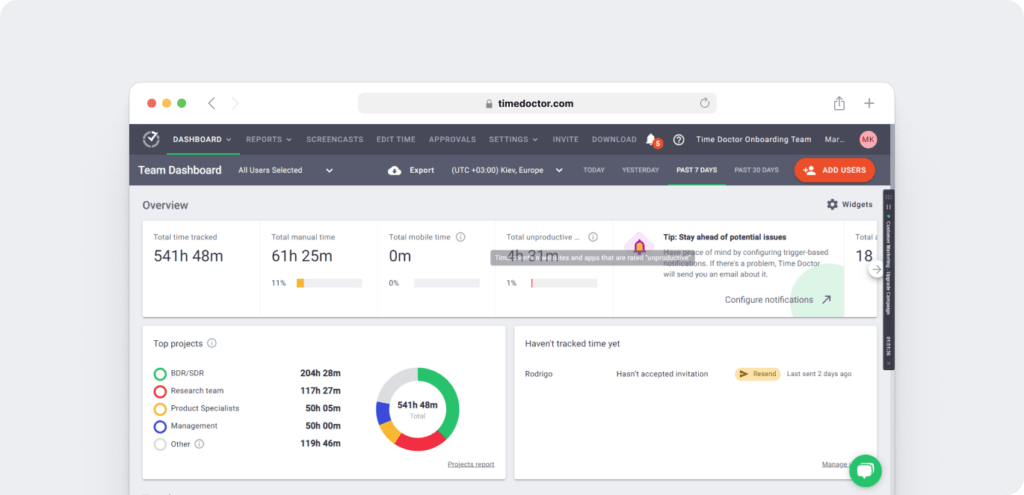
Time Doctor stands out with comprehensive features designed to improve productivity and streamline time tracking. In addition to its core features like automatic time tracking, distraction management, and powerful reporting, Time Doctor offers several solutions to help businesses optimize their workflows.
Key features
- Automatically track time
Automatically track the time spent by your employees on different tasks. - Monitor sites and apps
Monitor the sites and apps employees visit during work hours. - Track billable and non-billable hours
Track both billable and non-billable hours accurately to streamline billing and payment. - Identify unproductive employees
Identify unproductive employees and dramatically reduce wasted time. - Bill clients or pay employees
Bill clients or pay employees based on tracked time. - Reduce distractions
Reduce time spent on distractions by utilizing Time Doctor’s distraction management features.
Detailed features:
A) User-friendly time tracking system
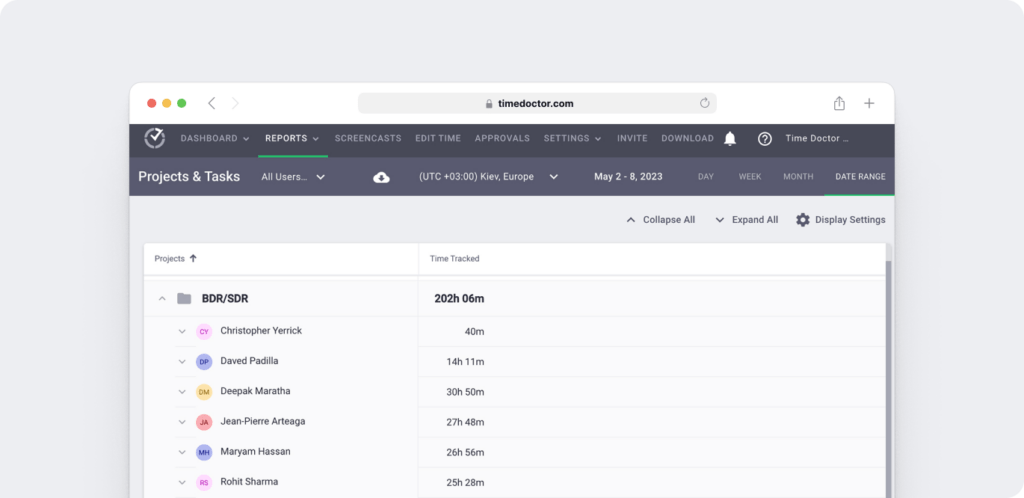
Time Doctor couldn’t be easier to use. Team members can track time manually by switching the timer on and off.
- This nudge is usually enough to get them off unproductive sites and back to work.
- For added customizability, you have complete control over what sites and apps are classified as unproductive.
- Time Doctor includes a “Poor Time Usage” feature that highlights when each employee accessed an unproductive website and how long they spent there.
B) State-of-the-art distraction management
Time Doctor has built-in distraction management features to help employees stay focused.
Displays a pop-up when employees access unproductive sites like Facebook or YouTube, asking if they’re still working.
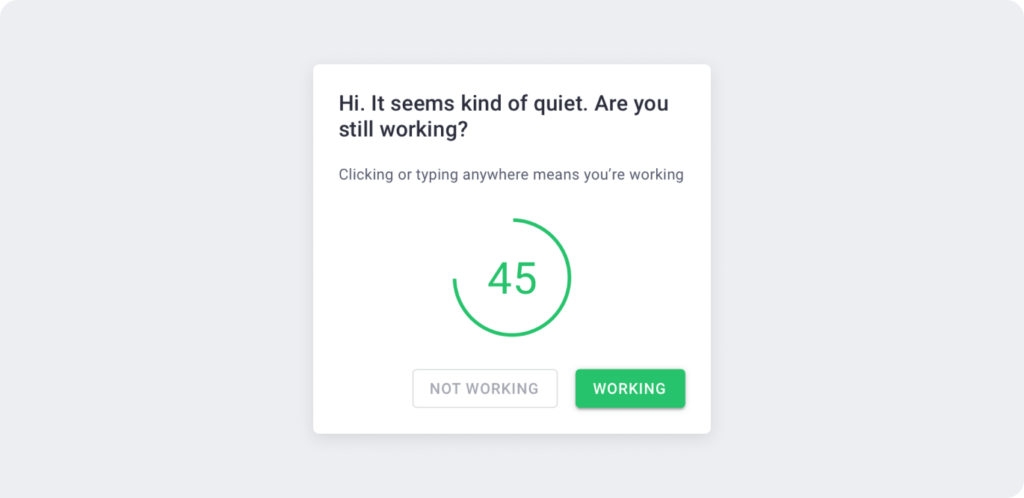
C) Powerful reporting
Time Doctor provides actionable reports for monitoring employees more effectively, including:
- Hours Tracked Report: The total hours worked by your staff over a given period.
- Attendance Report: The time spent on tasks by a single employee over a given duration.
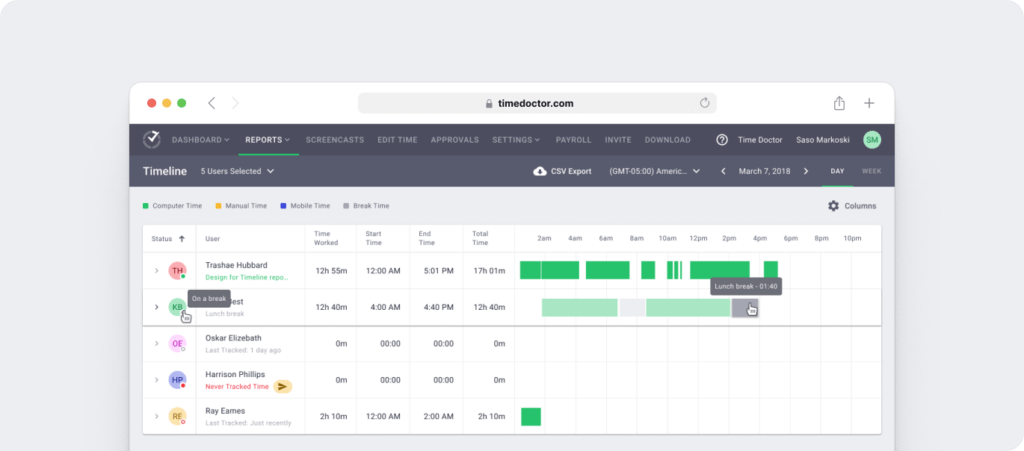
D) Inactivity monitoring
Time Doctor ensures active work hours are tracked by using inactivity monitoring:
Does NOT track what keys were pressed—only verifies if there was activity.
E) Client login
Clients can access dashboards to monitor project progress, view reports, timesheets, and screenshots in real time.
For added security, clients can only view their projects and not those of other clients.
F) Payroll
Time Doctor integrates with PayPal, Payoneer, and TransferWise to simplify payroll.
- Fully customizable with options for payment method, payroll period, hourly or fixed rates, and currency selection.
G) Integrations
Time Doctor integrates with dozens of popular apps like JIRA, Google Apps, Slack, and Zapier.
Tracks task-based activities to show how long each task took.
Enables automated time tracking for teams by monitoring employee logins and logouts.
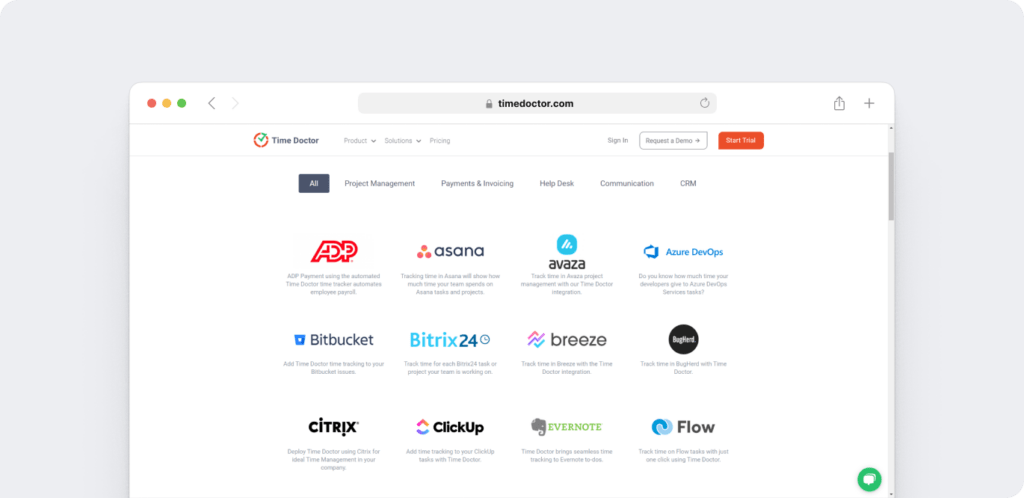
Pricing plans
- Basic: $6.70/user per month – Includes manual time tracking, monitoring of apps/sites, and unlimited projects.
- Standard: $11.70/user per month – Adds work-life balance insights, advanced integrations, and detailed reports.
- Premium: $16.70/user per month – Features video screen recording, work schedules, and real-time email notifications.
Use Time Doctor if
- You want to reduce distractions.
Its distraction management pop-ups ensure that employees stay focused and avoid unproductive sites during work hours. - You need detailed productivity insights.
Time Doctor’s robust reporting features, including Hours Tracked and Attendance reports, help identify inefficiencies and optimize workflows. - Payroll is a priority.
Automate payments for employees and freelancers with Time Doctor’s built-in payroll integrations, which reduce errors and save time.
2. Workfolio
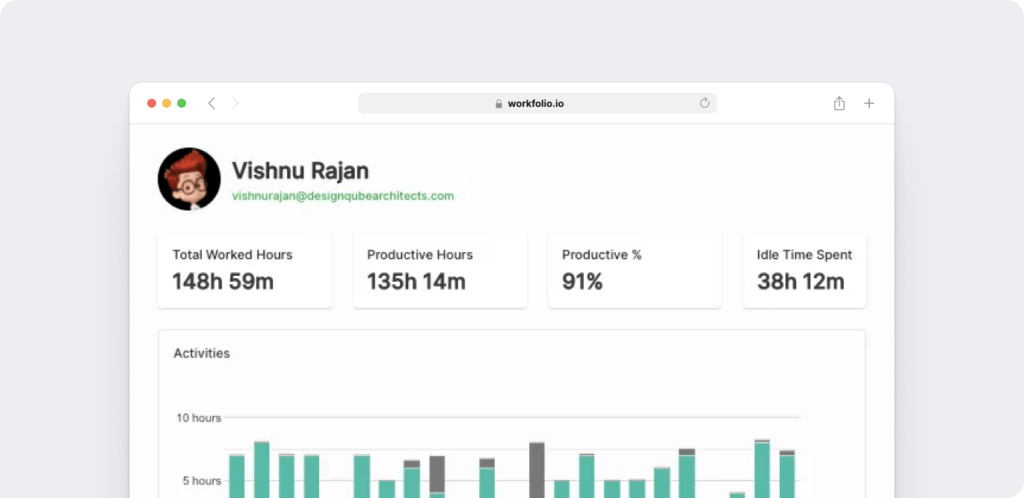
Workfolio is a straightforward time tracking tool for employee monitoring and time tracking. It’s ideal for teams or businesses that need essential features without complexity.
Key features
- Real-time website and app monitoring
- Customizable timesheets for payroll preparation
- Screenshot capturing in stealth or visible mode
Pricing plans
- Free: $0/user per month – Includes basic monitoring, screenshots, and reports for up to 2 users.
- Pro: $4.99/user per month – Adds unlimited teams, advanced reporting, and year-long data retention.
Use Workfolio if
- Your team is small or just starting, and you need an affordable tool to get basic monitoring capabilities. Workfolio’s free plan is a great way to test out its features.
- You’re looking for simple time tracking with minimal setup. Workfolio is intuitive, making it an effective team management solution that’s easy for teams to use immediately.
3. RescueTime
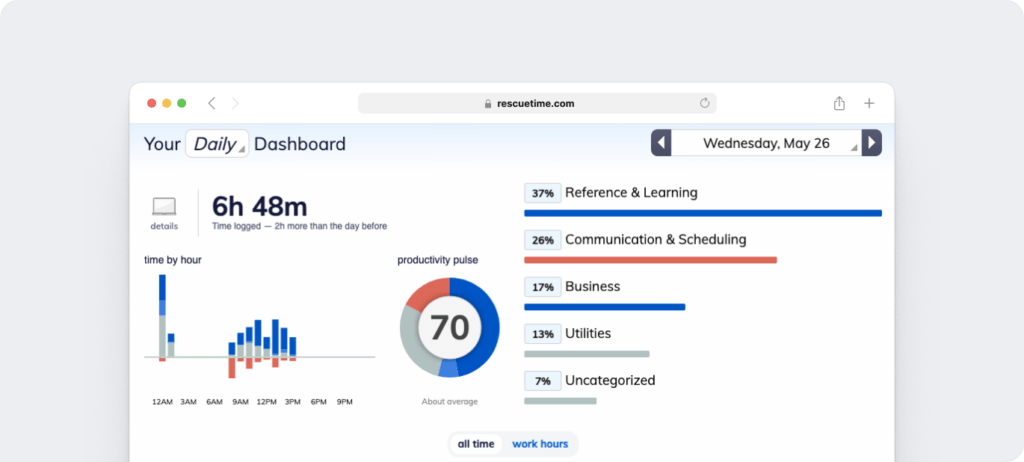
RescueTime is perfect for businesses focused on helping employees minimize distractions and improve individual productivity.
Key features
- Automatic time tracking for apps and websites
- Daily and weekly productivity scores
- Focus mode to block distractions
Pricing plans
- Lite: Free – Includes basic productivity tracking and three months of data retention.
- Premium: $12/user per month—This adds unlimited data history, goal setting, and focus tools.
Use RescueTime if
- Your team needs to understand how they spend their time and identify productivity trends. RescueTime’s weekly reports make this easy.
- You want to help employees reduce time spent on distractions like social media. Focus mode and goal-setting features can help them stay aligned with their tasks.
4. ProofHub
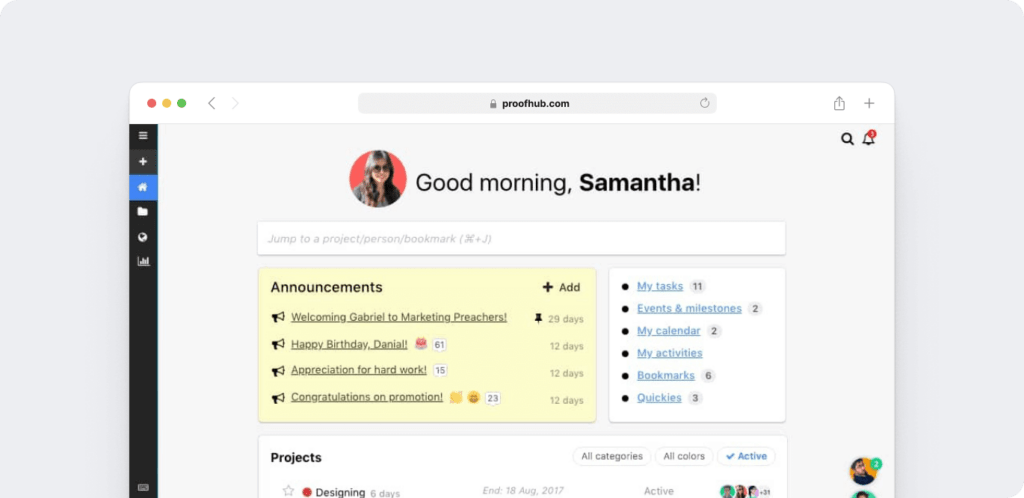
ProofHub is a project management tool that tracks time, making it an excellent choice for teams juggling multiple tasks and deadlines.
Key features
- Task and workflow organization with visual boards
- Timesheet tracking and reporting
- Built-in proofing tools for collaborative review
Pricing plans
- Essential: $45/month – Includes task management, 15GB storage, and basic integrations.
- Ultimate Control: $89/month – Adds custom workflows, advanced roles, and 100GB storage.
Use ProofHub if
- Your team needs to track time while managing projects and tasks in a single platform. ProofHub’s combination of tools, including notifications, works seamlessly across platforms, including Windows and Mac, to keep everything centralized.
- You require a solution that enhances collaboration. Its proofing tools are excellent for creative teams reviewing content and designs.
5. CleverControl
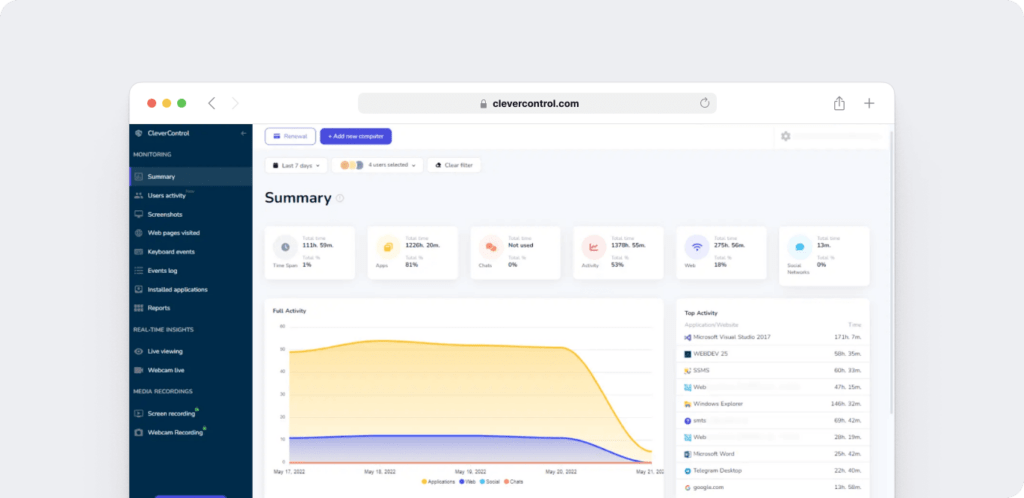
CleverControl is designed for detailed employee monitoring, making it a good choice for teams that work remotely or require compliance tracking.
Key features
- Website and app activity tracking
- Live screen viewing and webcam monitoring
- Keyword and email tracking for compliance
- GPS tracking for monitoring employee locations in real-time
Pricing plans
- Cloud-Based: Starting at $4.70/PC per month – Includes real-time tracking and 6-month data retention.
- On-Premise: Starting at $7.90/PC per month – Adds offline functionality and long-term storage.
Use CleverControl if
- Your team operates remotely, and you need detailed insights into their daily activities to ensure compliance and productivity.
- Your business requires a solution for monitoring sensitive tasks or projects. CleverControl’s live monitoring tools and Excel export capabilities make it easy to stay informed and analyze team performance.
6. ClickTime
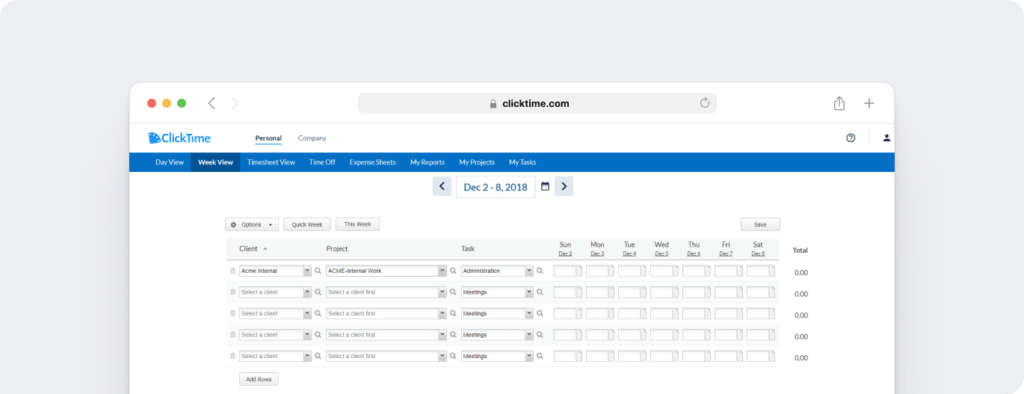
ClickTime excels at combining time tracking with features to clock in and expense management, making it an excellent option for small businesses managing budgets and clients.
Key features
- Expense tracking alongside time management
- Advanced invoicing options
- Over 80 pre-built reports that can be exported to CSV for customized reporting and data manipulation.
Pricing plans
- Starter: $12/user per month – Includes time tracking, reports, and email reminders.
- Team: $15/user per month – Adds approval workflows and advanced billing rates.
- Premier: $27/user per month – Includes project budgeting, resource planning, and custom dashboards.
Use ClickTime if
- Your business handles multiple clients, and you need to track billable hours and expenses together.
- You want a tool that simplifies invoicing and integrates well with payroll systems like QuickBooks.
7. Flowtrack
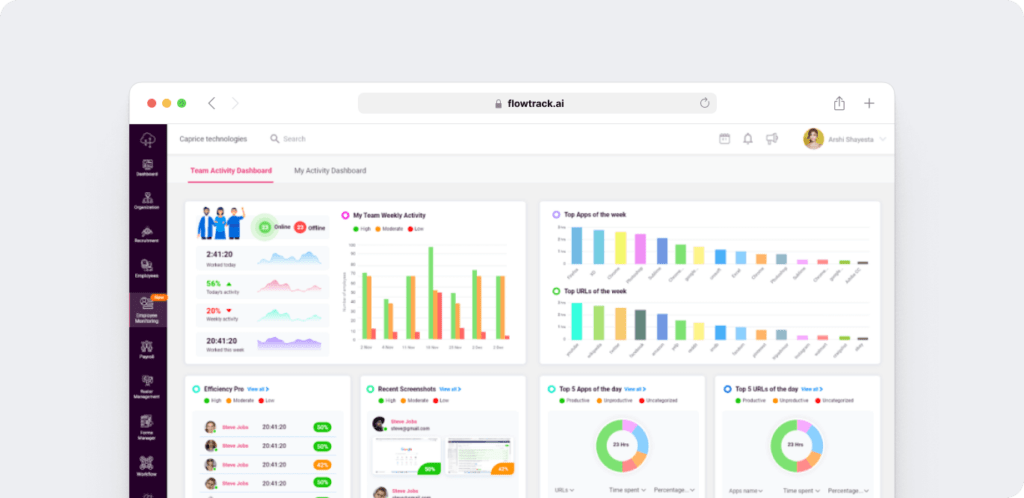
Flowtrack focuses on affordable employee monitoring, with tools to track engagement, activity, and employee productivity. These tools support profitability for smaller teams or startups.
Key features
- Employee activity analytics
- Insights into top performers and engagement levels
- Customizable tracking rules
Pricing plans
- Basic: $1.99/user per month – Includes activity tracking and basic analytics.
- Premium: $3.99/user per month – Adds advanced reporting and priority support.
Use Flowtrack if
- You’re a small business or startup looking for a budget-friendly way to track team performance.
- You need insights into employee engagement to optimize productivity and recognize top performers.
8. Desktime
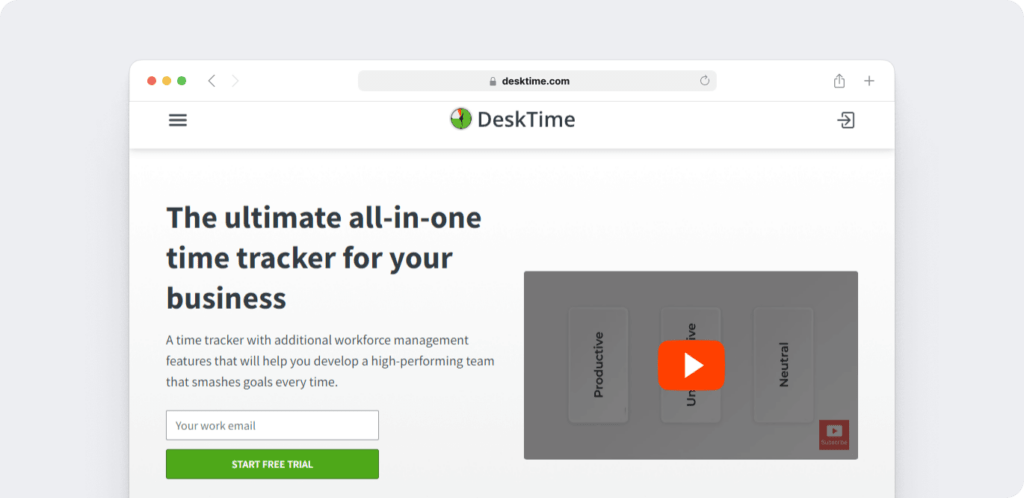
Desktime is a comprehensive time-tracking tool that offers detailed insights into productivity, making it a strong contender for managing both remote and in-office teams. It combines automatic time tracking with advanced analytics to help teams optimize their workday effectively.
Key features
- Automatic time tracking for seamless monitoring
- Daily productivity ratings and detailed visual reports
- Integrated scheduling and break time management
- Integrations with popular tools like Slack, Trello, and Asana
Pricing plans
- Lite: $7/user per month – Includes automatic tracking and productivity ratings.
- Pro: $10/user per month – Adds integrations, project tracking, and priority support.
- Premium: $20/user per month – Offers unlimited tracking, detailed reporting, and team analytics.
Use Desktime if
- Your team needs a fully automated solution to track time and boost efficiency. Desktime’s automatic tracking minimizes manual effort while delivering actionable insights.
- You’re looking for a tool that combines tracking with productivity analytics. Desktime’s visual reports and productivity ratings make it easier to identify areas of improvement.
- You want integrations with project management tools. Its compatibility with popular platforms helps teams streamline their workflows.
9. Harvest
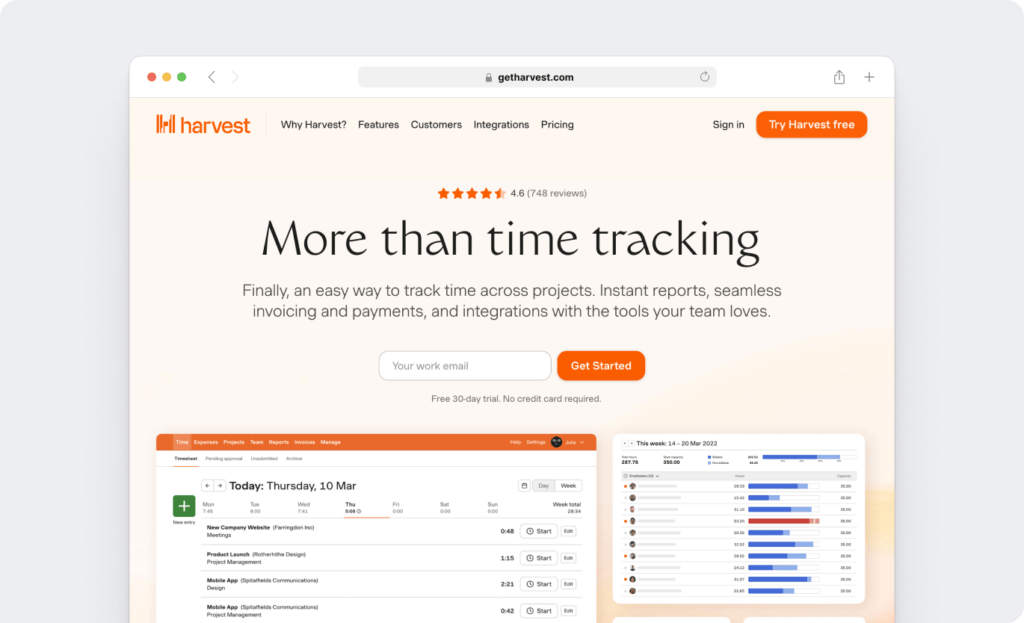
Harvest is a versatile time-tracking and invoicing tool tailored for businesses that work with multiple clients or projects. It helps teams track hours, manage budgets, and seamlessly generate invoices to streamline workflow and payments.
Key features
- Time tracking with integrated invoicing
- Budget and expense tracking for projects
- Reporting to track time, costs, and profitability
- Integrations with tools like Asana, Slack, and QuickBooks
Pricing plans
- Free: $0 – Includes time tracking and reporting for 1 user and 2 projects.
- Pro: $12/user per month – Adds unlimited users, projects, and advanced features like invoicing and team management.
Use Harvest if
- Your team works on multiple client projects and needs to track billable hours and expenses. Harvest simplifies this process by combining time tracking with invoicing.
- You want a tool that integrates well with popular project management platforms. Harvest’s integrations make it easy to align with your existing workflow.
- Managing budgets and project profitability is a priority. Harvest’s reporting and tracking tools ensure you stay on top of costs.
Here’s a comparison table summarizing the key features, pros, and cons of the nine Hubstaff alternatives mentioned:
| Tool | Key Features | Pros | Cons | Pricing |
| Time Doctor | Time tracking, distraction management, reporting, inactivity monitoring, client login, payroll, employee scheduling, integrations | Easy time tracking, powerful reporting, distraction management, cross-platform support, strong privacy controls | More suited for companies than freelancers, no free version | Basic: $6.70/user/month, Standard: $11.70/user/month, Premium: $16.70/user/month |
| Workfolio | Real-time monitoring, timesheets, automated screenshots, custom rules | Free forever plan, accurate timesheets, visible and stealth modes, supports unlimited users in Pro plan. | Inconsistent activity tracking, no mobile app, no integrations | Free: $0/user/month, Pro: $4.99/user/month |
| RescueTime | Automatic time management, goal-setting, distraction management, offline tracking | Detailed reports, user-friendly UI, powerful mobile apps | No client login, no task/project tracking, no billing/invoicing | RescueTime Lite: Free, RescueTime: from $9/month |
| ProofHub | Timesheet management, task management, reporting, task categorization | Easy to use, built-in task management, markup tools | No desktop tool, cannot set recurring tasks, fewer integrations | Essential: $45/month, Ultimate Control: $89/month |
| CleverControl | Website monitoring, webcam viewing, search query tracking, website blocker, integrations | Simple remote installation, iOS app for mobile admins, visual insights | Can be invasive, unusual pricing plans | Cloud-Based: Starting at $11/1 PC/ for 3 months, On-Premise: Starting at $8.30/1 PC/ for 12 months |
| ClickTime | Web/app monitoring, goal setting, invoicing, reporting | User-friendly, highly customizable, integrates with project management/payroll apps | Mobile app less feature-rich, can be expensive for large businesses, no client access | Starter: $12/user/month, Team: $15/user/month, Premier: $27/user/month, Enterprise: Price on request |
| Flowtrack | Activity monitoring, employee insights, user tracking, asset optimization | User-friendly UI, automated time monitoring, actionable analytics | No mobile app, limited admin configurations, manual setup can be time-consuming | Starts at $1.99/user/month |
| Desktime | Automatic tracking, productivity ratings, integrations, break scheduling | Fully automated tracking, detailed reports, easy integrations | Limited customization for reports | Lite: $7/user/month, Pro: $10/user/month, Premium: $20/user/month |
| Harvest | Time tracking, invoicing, budget management, profitability reports | Combines time tracking and invoicing, strong budget and expense tracking | Limited free plan, fewer distraction management features | Free: $0 (1 user, 2 projects), Pro: $12/user/month |
This table should help you quickly compare the features and pricing of these alternatives to Hubstaff.
Conclusion
Each Hubstaff alternative offers something valuable, providing unique features such as management software to oversee employee time and boost team productivity effectively.
However, Time Doctor is a well-rounded solution that increases team productivity and optimizes workflows. With features like distraction management, customizable reports, and seamless payroll integration, it’s designed to support your team in reaching their best performance.
Curious to learn more? Check out Time Doctor and discover how it can elevate the way your team works! Why not sign up for Time Doctor today and experience it yourself?


